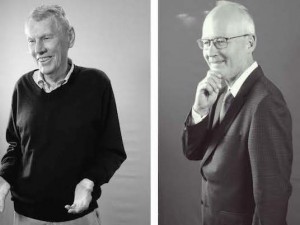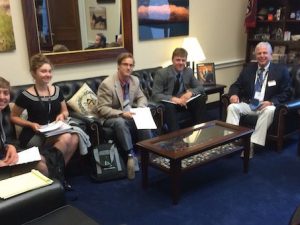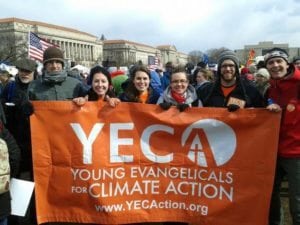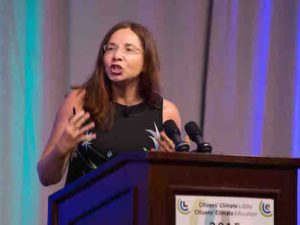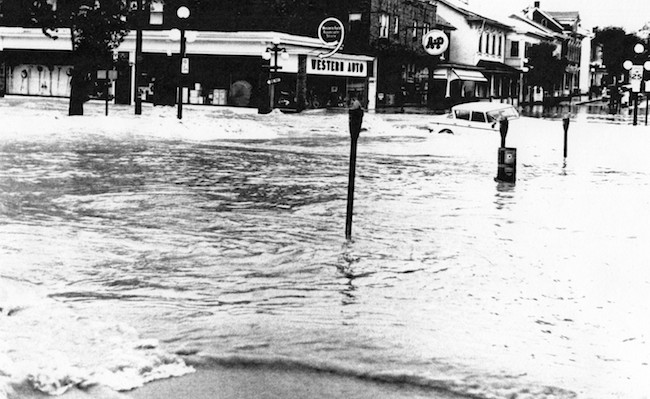
Flooding from Hurricane Agnes in 1972
Citizens’ Climate Radio is a monthly podcast hosted by CCLer Peterson Toscano. Browse all our past episode recaps here, or listen to past episodes here, and check out the latest episode in the post below.

Andrew Stuhl
“What do you remember about 1972?” That’s what Andrew Stuhl, an associate professor of environmental studies and sciences at Bucknell University, has been asking residents from Pennsylvania’s Susquehanna River Valley. He keeps hearing about the powerful smell of flood mud. This was the pungent odor throughout the Susquehanna Valley after Hurricane Agnes brought historic rainfalls and a massive flood, which upended lives and reshaped towns and waterways.
“It reminds me of the connection between smell and memory, and how quickly a memory can come back to you if you smell something in the present day,” Andrew tells podcast host Peterson Toscano.
“I like to think about that as a metaphor for the importance of history and the importance of moments like Hurricane Agnes. They’re always with us, and sometimes they don’t come to our immediate senses, but they can be triggered, and they can be brought up really quickly. I like to believe in the power of memory and history, to mine those experiences, to reflect on them, and recognize and regard them, so that we can walk today in the difficult moments, and get through them.”
Andrew talks about his community-based research, the Agnes Flood Project. You will learn why this one storm is still so important, not just for the region, but for the entire country. Lessons drawn from 1972 and the resiliency modeled by local residents during and after the storm will help us in coping and caring for each other during the coronavirus pandemic and with the growing risks of climate change.
If you or someone you know has Hurricane Agnes stories to share for the Agnes Flood project, contact Andrew Stuhl and the team at . They are also looking for pictures from the hurricane and its aftermath. This story was made possible through a collaboration with Susquehanna Life Out Loud podcast.
The Art House
How does an artist decide to do the work she does? How does that work evolve overtime? What impact does it have on the audience and how can an artist deepen that impact? During a recent conversation with dancer and choreographer Lynn Neuman, Peterson Toscano encountered an artist with boundless curiosity. This curiosity drives her work.
As director of Artichoke Dance Company, Lynn recognizes the vital role art plays in addressing issues like climate change. Entertaining and educating are not enough for Lynn and her company, though. They always want to do more to get people to act. Through community engagement and direct outreach to lawmakers, they are training community members how to change legislation.
And during the pandemic, Lynn Neuman and Artichoke Dance Company have been adjusting and adapting once again. See their Covid Creations. “It reflects our feelings of isolation and desires for connection during the coronavirus,” Lynn explains. “Filmed at various times of day, the series reflects the available bandwidth of the internet.”
Dig Deeper
- Hurricane Agnes, National Weather Services
- The 1972 Agnes Flood at Milton, PA, video with archival footage
- Dancing In Plastic — How One Woman Is Shining A Light On Plastic Pollution, Medium and accompanying video
- Waste Side Story, Robin Michals photography collaboration with dancer Lynn Neuman.
- New York State’s Bag Waste Reduction Law, NY Dept of Environmental Conservation
We always welcome your thoughts, questions, suggestions, and recommendations for the show. Leave a voicemail at (518) 595-9414 (+1 if calling from outside the USA). You can email your answers to radio@citizensclimate.org.
You can listen to Citizens’ Climate Radio on these platforms:
Also, feel free to connect with other listeners, suggest program ideas, and respond to programs in the Citizens’ Climate Radio Facebook group or on Twitter at @CitizensCRadio.
Citizens’ Climate Radio is a monthly podcast hosted by CCL volunteer Peterson Toscano.

